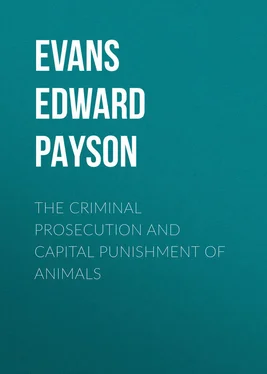Edward Evans - The Criminal Prosecution and Capital Punishment of Animals
Здесь есть возможность читать онлайн «Edward Evans - The Criminal Prosecution and Capital Punishment of Animals» — ознакомительный отрывок электронной книги совершенно бесплатно, а после прочтения отрывка купить полную версию. В некоторых случаях можно слушать аудио, скачать через торрент в формате fb2 и присутствует краткое содержание. Жанр: foreign_antique, foreign_prose, на английском языке. Описание произведения, (предисловие) а так же отзывы посетителей доступны на портале библиотеки ЛибКат.
- Название:The Criminal Prosecution and Capital Punishment of Animals
- Автор:
- Жанр:
- Год:неизвестен
- ISBN:нет данных
- Рейтинг книги:5 / 5. Голосов: 1
-
Избранное:Добавить в избранное
- Отзывы:
-
Ваша оценка:
- 100
- 1
- 2
- 3
- 4
- 5
The Criminal Prosecution and Capital Punishment of Animals: краткое содержание, описание и аннотация
Предлагаем к чтению аннотацию, описание, краткое содержание или предисловие (зависит от того, что написал сам автор книги «The Criminal Prosecution and Capital Punishment of Animals»). Если вы не нашли необходимую информацию о книге — напишите в комментариях, мы постараемся отыскать её.
The Criminal Prosecution and Capital Punishment of Animals — читать онлайн ознакомительный отрывок
Ниже представлен текст книги, разбитый по страницам. Система сохранения места последней прочитанной страницы, позволяет с удобством читать онлайн бесплатно книгу «The Criminal Prosecution and Capital Punishment of Animals», без необходимости каждый раз заново искать на чём Вы остановились. Поставьте закладку, и сможете в любой момент перейти на страницу, на которой закончили чтение.
Интервал:
Закладка:
An English professor of divinity, Richard Chevenix Trench, justifies the withering of the fruitless fig-tree on the same ground or, at least, by a similar process of reasoning: “It was punished, not for being without fruit, but for proclaiming by the voice of those leaves that it had such; not for being barren, but for being false.” According to this exegesis, it was the telling of a wilful lie that “drew on it the curse.” The guilty fig is thus endowed with a moral character and made clearly conscious of the crime for which it suffered the penalty of death: “Almost as soon as the word of the Lord was spoken, a shuddering fear may have run through all the leaves of the tree, which was thus stricken at the heart.” As regards the culpability and punishableness of the object, the modern divine and the mediæval jurist occupy the same standpoint; only the latter, with a stricter judicial sense, insists that there shall be no infliction of punishment until the malefactor has been convicted by due process of law, and that he shall enjoy all the safeguards which legal forms and technicalities have thrown around him and under whose covert even the vilest criminal has the right to take refuge. The Anglican hermeneutist, on the contrary, would justify the curse and admit the validity of the anathema, although it was only the angry expression of an unreasonable impatience disappointed in not finding fruit at the wrong season, “for the time of figs was not yet.”
A curious and characteristic specimen of the absurd and illogical inferences, which Chassenée is constantly deducing from his texts, is the use he makes of the passage in Virgil’s first Georgic, in which the poet remarks that “no religion has forbidden us to draw off water-courses for irrigating purposes, to enclose crops with fences, or to lay snares for birds,” all these things being essential to successful husbandry. But from the right to snare birds, our jurisprudent infers the right to excommunicate them, since “no snares are stronger than the meshes of an anathema.” Far-fetched deductions and wretched twaddle of this sort fill many pages of the famous lawyer’s dissertation.
Coming down to more recent times, Chassenée mentions several instances of the effectiveness of anathemas, accepting as convincing testimony the ecstacies of saints and the extravagant statements of hagiologists without the slightest expression of doubt as to the truth of these legends. Thus he relates how a priest anathematized an orchard, because its fruits tempted the children of his parish and kept them away from mass. The orchard remained barren until, at the solicitation of the Duchess of Burgundy, the ban was removed. In like manner the Bishop of Lausanne freed Lake Leman from eels, which had become so numerous as seriously to interfere with boating and bathing; on another occasion in the year 1451 the same ecclesiastic expelled from the waters of this lake an immense number of enormous blood-suckers, which threatened to destroy all the large fish and were especially fatal to salmon, the favourite article of food on fast-days. This method of procedure was both cheap and effective and, as Felix Malleolus informs us in his Tractatus de Exorcismis (I), received the approbation of all the learned doctors of the University of Heidelberg: omnes studii Heydelbergensis Doctores hujusmodi ritus videntes et legentes consenserunt . By the same agency an abbot changed the sweet white bread of a Count of Toulouse, who abetted and protected heresy, into black, mouldy bread, so that he, who would fain feed souls with corrupt spiritual food, was forced to satisfy his bodily hunger with coarse and unsavoury provender. No sooner was the excommunication removed than the bread resumed its original purity and colour. Egbert, Bishop of Trier, anathematized the swallows, which disturbed the devotions of the faithful by their chirping and chattering, and sacrilegiously defiled his head and vestments with their droppings, when he was officiating at the altar. He forbade them to enter the sacred edifice on pain of death; and it is still a popular superstition at Trier, that if a swallow flies into the cathedral, it immediately falls to the ground and gives up the ghost. Another holy man, known as John the Lamb, cursed the fishes, which had incurred his anger, with results equally fatal to the finny tribe. It is also related of the honey-tongued St. Bernard, that he excommunicated a countless swarm of flies, which annoyed the worshippers and officiating priests in the abbey church of Foigny, and lo, on the morrow they were, like Sennacherib’s host, “all dead corpses.” William, Abbot of St. Theodore in Rheims, who records this miraculous event, states that as soon as the execration was uttered, the flies fell to the floor in such quantities that they had to be thrown out with shovels ( palis ejicientes ). This incident, he adds, was so well known that the cursing of the flies of Foigny became proverbial and formed the subject of a parable. [ Vita S. Bernardi , auctore Wilhelmo abbate S. Thod. Rhem. I. 11.] According to the usual account, the malediction was not so drastic in its operation and did not cause the flies to disappear until the next day. The rationalist, whose chill and blighting breath is ever nipping the tender buds of faith, would doubtless suggest that a sharp and sudden frost may have added to the force and efficacy of the excommunication. The saint resorted to this severe and summary measure, says the monkish chronicler, because the case was urgent and “no other remedy was at hand.” Perhaps this lack of other means of relief may refer to the absence of “deacons with fly-flaps,” who, according to a contemporary writer, were appointed “to drive away the flies when the Pope celebrateth.”
The island Reichenau in Lake Constance, which derives its name from its fertility and is especially famous for the products of its vineyards and its orchards, was once so infested by venomous reptiles as to be uninhabitable by human beings. Early in the eighth century, as the legend goes, it was visited by St. Pirminius, and no sooner had he set foot upon it than these creatures all crawled and wriggled into the water, so that the surface of the lake was covered for three days and three nights with serpents, scorpions and hideous worms. Peculiar vermifugal efficacy was ascribed to the crosier of St. Magnus, the apostle of Algau, which was preserved in the cloister of St. Mang at Füssen in Bavaria, and from 1685 to 1770 was repeatedly borne in solemn procession to Lucerne, Zug, Schwyz and other portions of Switzerland for the expulsion and extermination of rats, mice, cockchafers and other insects. Sometimes formulas of malediction were procured directly from the pope, which, like saints’ curses, could be applied without legal formalities. Thus in 1660 the inhabitants of Lucerne paid four pistoles and one Roman thaler for a document of this kind; on Nov. 15, 1731, the municipal council of Thonou in Savoy resolved to join with other parishes of that province to obtain from Rome an excommunication against insects, the expenses for which are to be assessed pro rata ; 2 2 “Item: a été délibéré que la ville se joindra aux paroisses de cette province qui voudront obtenir de Rome une excommunication contre les insects et que l’on contribuera aux frais au pro rata.”
in 1740 the commune of Piuro purchased from His Holiness a similar anathema; in the same year the common council of Chiavenna discussed the propriety of applying to Rome for an execratory against beetles and bears; and in December 1752 it was proposed by the same body to take like summary measures in order to get rid of a pest of rodents. In 1729, 1730 and 1749 the municipal council of Lucerne ordered processions to be made on St. Magnus’ Day from the Church of St. Francis to Peter’s Chapel for the purpose of expelling weevils. This custom was observed annually from 1749 to 1798. The pompous ceremony has been superseded in Protestant countries by an officially appointed day of fasting and prayer.
Интервал:
Закладка:
Похожие книги на «The Criminal Prosecution and Capital Punishment of Animals»
Представляем Вашему вниманию похожие книги на «The Criminal Prosecution and Capital Punishment of Animals» списком для выбора. Мы отобрали схожую по названию и смыслу литературу в надежде предоставить читателям больше вариантов отыскать новые, интересные, ещё непрочитанные произведения.
Обсуждение, отзывы о книге «The Criminal Prosecution and Capital Punishment of Animals» и просто собственные мнения читателей. Оставьте ваши комментарии, напишите, что Вы думаете о произведении, его смысле или главных героях. Укажите что конкретно понравилось, а что нет, и почему Вы так считаете.












